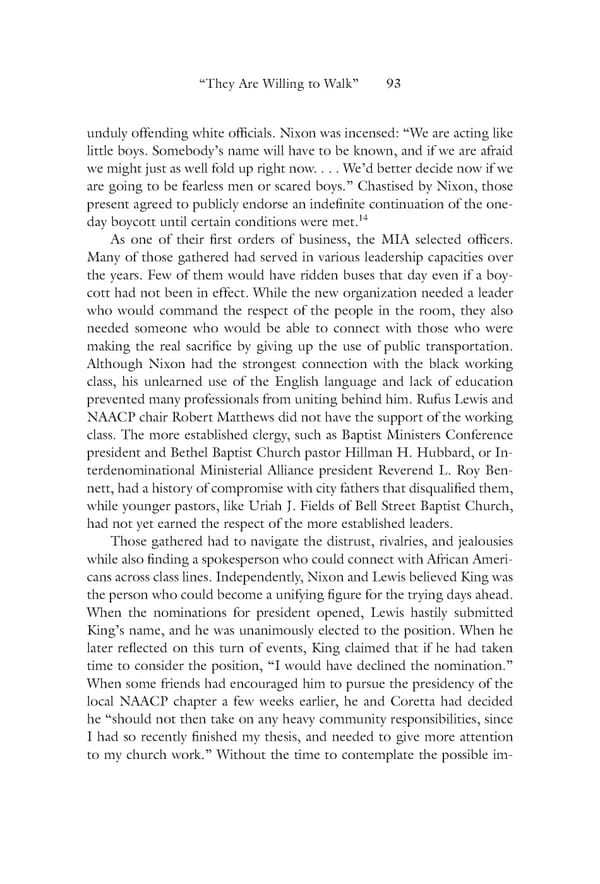“They Are Willing to Walk” 93 unduly offending white officials. Nixon was incensed: “We are acting like little boys. Somebody’s name will have to be known, and if we are afraid we might just as well fold up right now. . . . We’d better decide now if we are going to be fearless men or scared boys.” Chastised by Nixon, those present agreed to publicly endorse an indefinite continuation of the one- 14 day boycott until certain conditions were met. As one of their first orders of business, the MIA selected officers. Many of those gathered had served in various leadership capacities over the years. Few of them would have ridden buses that day even if a boy- cott had not been in effect. While the new organization needed a leader who would command the respect of the people in the room, they also needed someone who would be able to connect with those who were making the real sacrifice by giving up the use of public transportation. Although Nixon had the strongest connection with the black working class, his unlearned use of the English language and lack of education prevented many professionals from uniting behind him. Rufus Lewis and NAACP chair Robert Matthews did not have the support of the working class. The more established clergy, such as Baptist Ministers Conference president and Bethel Baptist Church pastor Hillman H. Hubbard, or In- terdenominational Ministerial Alliance president Reverend L. Roy Ben- nett, had a history of compromise with city fathers that disqualified them, while younger pastors, like Uriah J. Fields of Bell Street Baptist Church, had not yet earned the respect of the more established leaders. Those gathered had to navigate the distrust, rivalries, and jealousies while also finding a spokesperson who could connect with African Ameri- cans across class lines. Independently, Nixon and Lewis believed King was the person who could become a unifying figure for the trying days ahead. When the nominations for president opened, Lewis hastily submitted King’s name, and he was unanimously elected to the position. When he later reflected on this turn of events, King claimed that if he had taken time to consider the position, “I would have declined the nomination.” When some friends had encouraged him to pursue the presidency of the local NAACP chapter a few weeks earlier, he and Coretta had decided he “should not then take on any heavy community responsibilities, since I had so recently finished my thesis, and needed to give more attention to my church work.” Without the time to contemplate the possible im-
 Becoming King: Martin Luther King Jr. Page 113 Page 115
Becoming King: Martin Luther King Jr. Page 113 Page 115